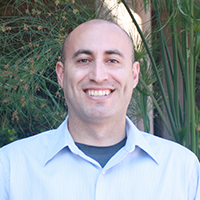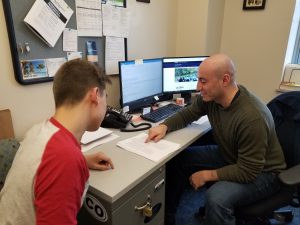Dr. Joseph Cooper launched his new book, From Exploitation Back to Empowerment: Black Male Holistic (Under)Development Through Sport and (Mis)Education on February 18, 2019.
View the full photo album.
Web cookies (also called HTTP cookies, browser cookies, or simply cookies) are small pieces of data that websites store on your device (computer, phone, etc.) through your web browser. They are used to remember information about you and your interactions with the site.
Session Management:
Keeping you logged in
Remembering items in a shopping cart
Saving language or theme preferences
Personalization:
Tailoring content or ads based on your previous activity
Tracking & Analytics:
Monitoring browsing behavior for analytics or marketing purposes
Session Cookies:
Temporary; deleted when you close your browser
Used for things like keeping you logged in during a single session
Persistent Cookies:
Stored on your device until they expire or are manually deleted
Used for remembering login credentials, settings, etc.
First-Party Cookies:
Set by the website you're visiting directly
Third-Party Cookies:
Set by other domains (usually advertisers) embedded in the website
Commonly used for tracking across multiple sites
Authentication cookies are a special type of web cookie used to identify and verify a user after they log in to a website or web application.
Once you log in to a site, the server creates an authentication cookie and sends it to your browser. This cookie:
Proves to the website that you're logged in
Prevents you from having to log in again on every page you visit
Can persist across sessions if you select "Remember me"
Typically, it contains:
A unique session ID (not your actual password)
Optional metadata (e.g., expiration time, security flags)
Analytics cookies are cookies used to collect data about how visitors interact with a website. Their primary purpose is to help website owners understand and improve user experience by analyzing things like:
How users navigate the site
Which pages are most/least visited
How long users stay on each page
What device, browser, or location the user is from
Some examples of data analytics cookies may collect:
Page views and time spent on pages
Click paths (how users move from page to page)
Bounce rate (users who leave without interacting)
User demographics (location, language, device)
Referring websites (how users arrived at the site)
Here’s how you can disable cookies in common browsers:
Open Chrome and click the three vertical dots in the top-right corner.
Go to Settings > Privacy and security > Cookies and other site data.
Choose your preferred option:
Block all cookies (not recommended, can break most websites).
Block third-party cookies (can block ads and tracking cookies).
Open Firefox and click the three horizontal lines in the top-right corner.
Go to Settings > Privacy & Security.
Under the Enhanced Tracking Protection section, choose Strict to block most cookies or Custom to manually choose which cookies to block.
Open Safari and click Safari in the top-left corner of the screen.
Go to Preferences > Privacy.
Check Block all cookies to stop all cookies, or select options to block third-party cookies.
Open Edge and click the three horizontal dots in the top-right corner.
Go to Settings > Privacy, search, and services > Cookies and site permissions.
Select your cookie settings from there, including blocking all cookies or blocking third-party cookies.
For Safari on iOS: Go to Settings > Safari > Privacy & Security > Block All Cookies.
For Chrome on Android: Open the app, tap the three dots, go to Settings > Privacy and security > Cookies.
Disabling cookies can make your online experience more difficult. Some websites may not load properly, or you may be logged out frequently. Also, certain features may not work as expected.
Dr. Joseph Cooper launched his new book, From Exploitation Back to Empowerment: Black Male Holistic (Under)Development Through Sport and (Mis)Education on February 18, 2019.
View the full photo album.
The San Francisco Chronicle shares EDLR’s Dr. Preston Green’s comments on Charter Schools.
In Higher Education, it is not uncommon for students to balance their studies with a full- or part-time job. Many students enrolled in the programs of the University of Connecticut’s Department of Educational Leadership (EDLR) are not only students, but working professionals in the field. The “Student-Professionals” series will highlight these hard-working student-professionals and how they balance their responsibilities. This feature focuses on a student-professional in the SPM program.

Miguel Colón, a student in the Sport Management master’s program at the University of Connecticut, works hard to maintain an academic and professional career as both a full-time student and the Interim Associate Director for UConn Community Outreach.
Colón says he never expected to go to school for Sport Management, but ever since he was a little kid he always had a great affinity for sports. Now, close to completing a master’s degree and having worked closely with Community Outreach’s 14 youth development and education programs and the student leaders in those programs for the past 11 years, Colón wouldn’t have it any other way.
As both a student and the new Interim Associate Director for Community Outreach, Colón is faced with challenges every day. Nevertheless, he strives to create a positive environment in every aspect of his academic and professional life. A big sports fan, Colón understands the social implications of physical exercise and applies this knowledge to his daily life – both within and outside of the office.
He sees sport as a vehicle for both personal and social change; as he puts it, “sports reflect society”.

A first-generation college student, Colón was well-acquainted with facing challenges and overcoming obstacles long before he began his higher education path. He migrated to the mainland US from Puerto Rico at the age of 14, and says that navigating a new bureaucracy, seeking out help and support, and finding mentors who could guide and direct him were just a few of the challenges of joining a new educational system. In his feature with WNPR, Colón shares more details about his experience as a first-generation college student.
Because of his unique background, Colón says he views college in a way that’s different from most. Although it was difficult at times, he says he enjoyed going through the experience. The most rewarding aspect of his sometimes-demanding lifestyle, he says, is seeing how he’s able to trailblaze through thick and thin. The ability to acknowledge what you have been able to accomplish, he notes, is vital to moving forward in your life.
As a student-professional, Colón appreciates the time he spends working with people and communicating with students, colleagues, and professors. Communication is vital to his area of study, he says, and using and honing these skills not only benefits him in the classroom but also in his personal and professional spheres.
To other student-professionals, Colón emphasizes the importance of having a strong support network of faculty advisors, such as Drs. Burton and Cooper, who strive to put their students’ happiness and well-being before anything else. Even in times of crisis, as in the wake of Hurricane Maria which devastated his family in Puerto Rico, Colón knew he had several shoulders to lean on. But, at the end of the day, Colón admits that self-motivation is huge. Especially in a fast-paced work environment, Colón says committing to a task and following through is crucial; it’s one of the biggest pieces of advice he can offer. “Once I’m ready to do something,” says Colón, “I really act on it.”


Clinical Instructor Jen Michno and colleague Dr. Jennie Weiner agree that research on administrator preparation is critically important for the field of education. Both Michno and Weiner are recent recipients of grants that support this vital research area.
Michno’s focus is to better prepare administrators to excel in Family School Community Engagement (FSCE). “This research helps practitioners in the field understand the types of strategies and practices that will garner the best outcomes for students in schools,” she says. Weiner’s research focuses on students’ experiences within the preparatory programs themselves: “Are we, instructors in preparation programs, replicating patterns that are problematic and that reify discriminatory and ineffectual practices?” she asks. “More progressive, feasible, appropriate ways of thinking about leadership need to be learned and discussed.”
Thanks to a generous grant from the Hartford Foundation for Public Giving (HFPG), Jen Michno is currently conducting research that will inform the design and implementation of a new module of the Department of Educational Leadership’s UConn Administrator Preparation Program (UCAPP) curriculum that will focus on the area of Family School Community Engagement (FSCE). The new FSCE module will ultimately become part of the curriculum for all UCAPP students, and will also be made available to several HFPG priority school districts across the state for use with currently-practicing administrators.
“There is clear evidence at the national level that there is a lack of focus on Family School Community Engagement in administrator preparation programs across the country. FSCE practices promote equity in schools and should be an integral part of every individual’s administrator preparation experience. This research addresses this issue by creating an empirically-validated FSCE curriculum module that will reach not only UCAPP students but administrators across Connecticut.” - Jen Michno

Broadly, Dr. Jennie Weiner’s research aims to redefine conceptualizations of leadership: to “move away from the ‘great (white) man’ theory, both literally and figuratively.” Her current research project investigates the experiences of black woman administrators–including their current roles and their experiences in preparatory programs–to understand if and how they have experienced microaggressions. After conducting a 10-person pilot study (forthcoming in the Journal of Research on Leadership Education), Weiner, Dr. Laura Burton, and Daron Cyr, a doctoral student in Educational Leadership, were recently awarded the Spencer Foundation Grant for Small Studies. This grant will allow them to widen the scope of the study to 25 participants, and to learn more comprehensively about each participant’s experience and career trajectory. “The ultimate goal is to create opportunities so that leadership itself is more inclusive and equitable in terms of who has access to it and who can succeed in the work,” says Weiner.
“We know from the pilot study that the participants experienced quite a few microaggressions in their administrator preparation programs. They cited being invisible in the space, never getting to talk about how their racial or gender identities might impact how people respond to them or how they engage in leadership, and a serious lack of curriculum written by anyone other than white men.” - Dr. Jennie Weiner
Whenever there were conversations about race, says Weiner, they were either centered around white privilege or students’ racial identities. “There was a focus on better understanding students from minoritized groups, which implies that the administrators are white,” she says. “And discussions about white privilege, while important, don’t really pertain to black women. There was more than one story in which a woman said she had to listen while instructors tried to convince a white man that white privilege was real. How safe or encouraged could she or anyone else outside our society’s dominant groups feel in that space?”
The impacts of both Michno’s and Weiner’s research are impressive, and neither woman’s work is without challenges. “As new material is introduced,” says Michno, “there is inevitably less time for other topics. Finding that perfect curricular balance is the biggest challenge emerging from this research.” For Weiner, the nature of her research calls for constant growth and learning. “Real change is really hard,” she says. “Every day I see the pain and the unfairness of how discrimination impacts people. I want change to happen yesterday but I also understand that this is not how things work. That said, I am committed to use my privilege to make a difference.”
But with the challenges come successes. “I get most excited when I think about the impact this will have, not only on leader development but also on the students within these school systems,” says Michno. For Weiner, it’s rewarding to do work that feels relevant: “Maybe I could help somebody feel a little less alone or a little more empowered. Getting to work toward changing things that I think are wrong–what a gift!” Thanks to the HFPG and the Spencer Foundation, Michno and Weiner are making strides toward sustainable change that supports CT's emerging leaders.
CT Post highlight’s Sport Management alumna, Jamelle Elliott in her return to UConn as the Associate Athletic Director for the National C Club; a return that makes her feel ‘at home’.
Salon (Professor Preston Green is quoted about charter school funding)
Capital and Main (Professor Preston Green quoted)
neaToday (Neag School’s Preston Green is quoted about charter school closures)